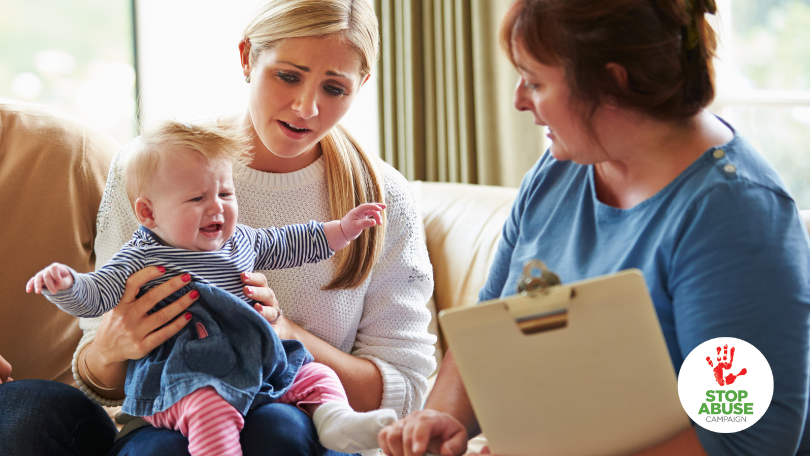“A young mom met her home visitor when she was 16 and pregnant. A key component of home visiting is assessing the needs and goals of each family and connecting them to resources. The mom notes that her home visitor ‘helped me with all of the testing I needed while I was pregnant. With getting to my doctor’s appointment, diapers, then there was like a breastmilk resource because I breastfed. It was like resources for everything. Everything I needed…she had it.”
“Her home visitor reflects, ‘It was really remarkable to start working with her and to see her in school and to see her progress in her pregnancy. Just seeing her journey through that and to grow in confidence as a parent, and to also figure out childcare and to continue her schooling even though that can be hard with a young one at home, but she did it. It’s really been remarkable, she’s an incredible young woman and has really has accomplished so much over these last few years.”
“By working with her home visitor, the client was able to build her own parenting skills and confidence, ‘She kind of put me in a way so I got the hang of it, and after I got the hang of it I could do it on my own so it was like, I know how this goes, I got this now.”
What is the Maternal, Infant, and Early Childhood Home Visiting (MIECHV) program?
The Maternal, Infant, and Early Childhood Home Visiting (MIECHV) is a funding stream that provides almost three dozen programs with funding to assist expectant mothers and parents of young children. These programs are particularly effective at breaking the cycle of abuse.
In order to define and attain objectives that enhance their health and well-being, families opt to take part in home visitation programs and work with specialists in the fields of health, social work, and child development.
Many are unaware that such programs even exist, even though they can play a vital role in shaping the trajectory of a family’s life.
Advantages and benefits of home visits
The program focuses on:
- Preventing child abuse,
- Improving maternal and child health,
- Reducing crime and domestic violence,
- Increasing family education level and earning potential,
- Encouraging children’s development and readiness to participate in school,
- Connecting families to needed community resources and supports.
What is a home visit and how does it work?
Home visitors and families develop a strong relationship through frequent visits. A home visitor assists parents in all aspects of raising their children. They support healthy pregnancy practices, provide information on topics such as breastfeeding, safe sleep, preventing unintended child injuries, and nutrition, and encourage early language development and early learning at home.
They also teach positive parenting skills like reading, playing, and praising good behaviors, work with caregivers to set goals for the future, continue their education, and find employment and child care solutions.
What is the purpose of Maternal Infant Health programs (MIECHV)?
Visits by caring, experienced professionals can turn good intentions into good parenting, breaking generations-long cycles of poverty, addiction, abuse, and despair, making MIECHV a critical piece to providing a continuum of care for children from birth to age five.
In Fiscal Year (FY) 2020, home visiting programs funded by MIECHV served over 140,000 parents and children and provided 925,000 home visits nationwide.
Virtual Maternal Home Visits
Some home visiting models have expanded this customized approach in recent years to incorporate virtual service delivery, backed by assessments to guarantee continuing implementation.
Through the use of virtual home visits, MIECHV has been able to reach more underserved populations, avoid service delivery interruptions brought on by illness or bad weather, and offer more immediate and flexible assistance. Virtual home visits became more prevalent as a result of the pandemic, enabling families to keep in touch while facing unimaginable challenges.
MIECHV Home Visiting programs effectiveness and facts
The MIECHV funded programs served many of the most vulnerable families in FY 2020:
- 70 percent of participating families had household incomes at or below 100 percent of the Federal Poverty guidelines ($26,200 for a family four), and 41 percent were at or below 50 percent of those guidelines,
- 62 percent of adult program participants had a high school education or less,
- 78 percent of participating adults and children relied on Medicaid or CHIP.
- Of all households served:
- 21 percent reported a history of child abuse and maltreatment,
- 15 percent reported substance abuse,
- 10 percent included pregnant teens.
- The MIECHV program reached many communities in FY 2020:
Evidence-based home visitation MIECHV saves the future
Decades of neurobiology study have proven how crucial early experiences are for setting the groundwork for developing brains in children.
Early experiences have a significant influence on brain development, which affects future social, cognitive, and emotional ability. These studies emphasize the importance of parenting during a child’s formative years.
Children and families that confront additional problems including teen or single motherhood, maternal depression, and a lack of social and financial support might benefit from high-quality home visiting programs, in particular.
MIECHV re-authorization 2022: Help us break the cycle of abuse
Providing that helping hand to a struggling family can be the make or break factor in a young child’s life. Maternal Home Visiting programs break the cycle of abuse.
Please, click this link to let your federal legislators know how important it is to you that we invest in children, families, and the prevention of the cycle of abuse, trauma, and poverty.
Do you know your score?
Discover your ACE score and unlock a new understanding of your life. Take the test and gain insights into how your early experiences shape your well-being. Don't let your past define you – empower yourself with knowledge.

Bisma Abedin
Communications Major
Bisma is a recent graduate from CUNY Baruch College, majoring in Communications. She likes long drives, exploring new parks, trying new food, and making a positive change in the world.
